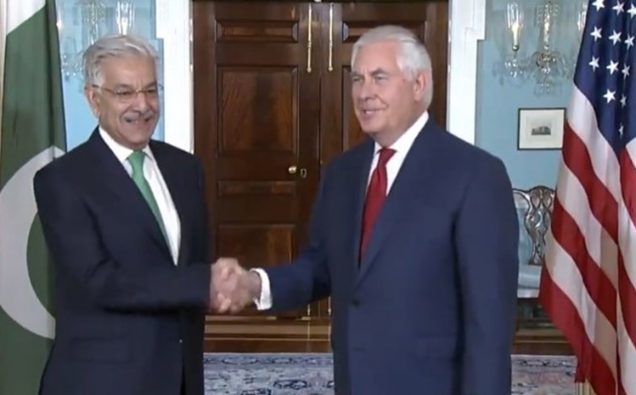
Secretary of State Rex Tillerson Wednesday expressed confidence in Pakistan being a reliable U.S. partner, underscoring that the U.S.-Pakistan relationship remains “extraordinarily” important.
“Yes, I believe we do. I think the Pakistan – it’s very – the Pakistan relationship and the U.S. relationship is extraordinarily important regionally,” Tillerson said, when asked pointedly if the U.S. has a reliable partner in Pakistan.
America’s chief diplomat expressed these views after a meeting with Foreign Minister Khawaja Asif that took place amid fresh tensions in the bilateral relationship, stemming from their differences over Washington’s new Afghan and South Asian policy.
Pakistan’s Ambassador to the United States Aizaz Chaudhry accompanied FM Asif at Wednesday’s meeting. Asif will also meet the U.S. National Security Adviser and speak at the U.S. Institute of Peace.
The two countries have public voiced differences since over the way forward in the Afghan war since the Trump Administration unveiled a new Afghan policy. Pakistan says the policy does not take into account its key concerns and has objected to any prospect of India getting a bigger role in Afghanistan.
But Tillerson said President Donald Trump’s policy is not just about Afghanistan but very much about importance and stability of Pakistan.
“And as we rolled out the South Asia strategy, we spoke about it in a regional context. It is not just about Afghanistan. This is about the importance of Pakistan, and Pakistan’s long-term stability as well.
“We have concerns about the future of Pakistan’s government too, in terms of them – we want their government to be stable. We want it to be peaceful. And many of the same issues they’re struggling with inside of Pakistan are our issues.
“So we think there is opportunity for us to strengthen that relationship. We’re going to be working very hard at all levels, from the State Department to the Defense Department to our intelligence communities, as well as economic, commerce opportunities as well. So it really is a regional approach, and Pakistan is critical, I think, to the long-term stability of the region.”
The meeting between the top diplomats of the two countriees took place at a critical time for both the United States and Pakistan, two countries have highest stakes in a stable Afghanistan.
In Afghanistan worsening security situation has alarmed the United States, which is sending thousand of more troops to arrest Afghanistan’s fall into chaos and collapse.
Pakistan, which shares a long border with Afghanistan, calls for a political resolution to the ongoing conflict in Afghanistan, where lingering issues like ethnic rivalries, a woeful lack of governance, political infighting and a dangerous Afghan Taliban insurgency have made matters worse. The ISIS militancy has added a new dimension to the fight against militancy.
Meanwhile, Pakistan-India tensions have also been ratcheting up, whit both sides exchanging fire across the Line of Control in the disputed Kashmir territory.
For its part, the United States has blamed Pakistan for allowing the Afghan Taliban and the Haqqani network to have sanctuaries on its soil, and therefore, fueling the Afghan insurgency.
At a Congressional testimony, Josep Dunford the US Joint Chiefs of Staff Chairman, alleged that the Inter-Services Intelligence (ISI) of Pakistan has connections with extremist groups.
“It is clear to me that the Inter-Services Intelligence has connections with terrorist groups,” Dunford.
Islamabad denies allegations of backing the Afghan Taliban insurgency, and says it has acted against all kinds of militants that operated on its soil.
Defense Secretary James Mattis, an influential figure within the Trump Administration, recently was in South Asia where he had meetings with the Afghan and Indian officials but skipped Pakistan in a move that has been interpreted as signaling the U.S. displeasure with the country.
Last month, Pakistani Prime Minister Shahid Khaqan Abbasi held talks with U.S. Vice President Mike Pence on the margins of the UN General Assembly.
During his speech to the forum, the Pakistani leader and foreign minister Asif in his think tank appearance, laid out Pakistan’s point of view, highlighting the country’s economic losses to the tune of $ 120 billion and thousands of fatalities in the face of terrorist bombings.
Pakistani officials argue that Western world sponsored the rise of the Mujahideen in Afghanistan during their 1980s fight against Soviet occupation, and now that new generation of militants in the form of the Taliban and other groups has troubled the region.
At the same time, Washington and Islamabad – which analysts say need each other not only for security and stability in Afghanistan but across the broader South Asian region – have been expressing readiness to work out their differences and take forward counterterrorism cooperation.
“We need to try one more time to make this strategy work with them, by, with and through the Pakistanis, and if our best efforts fail, the President is prepared to take whatever steps are necessary,” Mattis told a hearing of the House Armed Services Committee.

















